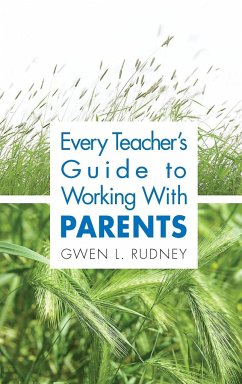Gwen L. Rudney
Every Teacher's Guide to Working With Parents
Schade – dieser Artikel ist leider ausverkauft. Sobald wir wissen, ob und wann der Artikel wieder verfügbar ist, informieren wir Sie an dieser Stelle.
Gwen L. Rudney
Every Teacher's Guide to Working With Parents
- Gebundenes Buch
- Merkliste
- Auf die Merkliste
- Bewerten Bewerten
- Teilen
- Produkt teilen
- Produkterinnerung
- Produkterinnerung
Educator (and parent) Gwen Rudney offers straightforward strategies and suggestions to help teachers collaborate with parents to improve life and learning for all children.
Andere Kunden interessierten sich auch für
![Working With Families and Community Agencies to Support Students With Special Needs Working With Families and Community Agencies to Support Students With Special Needs]() Jim YsseldykeWorking With Families and Community Agencies to Support Students With Special Needs63,99 €
Jim YsseldykeWorking With Families and Community Agencies to Support Students With Special Needs63,99 €![Involving Parents of Students With Special Needs Involving Parents of Students With Special Needs]() Jill C. DardigInvolving Parents of Students With Special Needs77,99 €
Jill C. DardigInvolving Parents of Students With Special Needs77,99 €![A Guide to Co-Teaching with Paraeducators A Guide to Co-Teaching with Paraeducators]() Ann I. NevinA Guide to Co-Teaching with Paraeducators79,99 €
Ann I. NevinA Guide to Co-Teaching with Paraeducators79,99 €![The Teacher's Guide to Inclusive Education The Teacher's Guide to Inclusive Education]() Peggy A. HammekenThe Teacher's Guide to Inclusive Education44,99 €
Peggy A. HammekenThe Teacher's Guide to Inclusive Education44,99 €![The Effective Teacher's Guide to Sensory and Physical Impairments The Effective Teacher's Guide to Sensory and Physical Impairments]() Michael FarrellThe Effective Teacher's Guide to Sensory and Physical Impairments174,99 €
Michael FarrellThe Effective Teacher's Guide to Sensory and Physical Impairments174,99 €![Disability in the Family Disability in the Family]() Barbara BorosonDisability in the Family198,99 €
Barbara BorosonDisability in the Family198,99 €![Working With Hannah Working With Hannah]() Chris GlassWorking With Hannah60,99 €
Chris GlassWorking With Hannah60,99 €-
-
Educator (and parent) Gwen Rudney offers straightforward strategies and suggestions to help teachers collaborate with parents to improve life and learning for all children.
Produktdetails
- Produktdetails
- Verlag: Corwin
- Seitenzahl: 128
- Erscheinungstermin: 28. Juni 2005
- Englisch
- Abmessung: 235mm x 157mm x 12mm
- Gewicht: 347g
- ISBN-13: 9781412917742
- ISBN-10: 1412917743
- Artikelnr.: 21497529
- Herstellerkennzeichnung
- Libri GmbH
- Europaallee 1
- 36244 Bad Hersfeld
- gpsr@libri.de
- Verlag: Corwin
- Seitenzahl: 128
- Erscheinungstermin: 28. Juni 2005
- Englisch
- Abmessung: 235mm x 157mm x 12mm
- Gewicht: 347g
- ISBN-13: 9781412917742
- ISBN-10: 1412917743
- Artikelnr.: 21497529
- Herstellerkennzeichnung
- Libri GmbH
- Europaallee 1
- 36244 Bad Hersfeld
- gpsr@libri.de
Gwen L. Rudney, PhD, is an Associate Professor of Education at the University of Minnesota, Morris. A teacher of language arts and social studies at the middle school level for more than a decade, her teaching and research interests include classroom processes, teacher development, multicultural education, and working with parents. She has worked with student teachers and cooperating teachers in regional, national, and international settings. She is coauthor of Maximum Mentoring: An Action Guide for Teacher Trainers and Cooperating Teachers. She enjoys serving as the chair of the Minnesota Teacher of the Year Program. In 2004, she received the University of Minnesota, Morris, Alumni Teaching Award.
Preface Acknowledgments About the Author 1. Understanding the Lives of Parents: Why Do They Do Those Things They Do? Scenario: "If the Parents Would Just..." Demands and Decisions What Experts Have to Say Quick Tips on Important Issues Popular Literature A Theoretical Look at Parenting Styles So, What
s the Problem? What
s a Parent to Do? Avoid Extremes Focus on the Target Goals of Parenting Try Hard...and Keep Trying The Kids Have a Role Children Grow and Change Parents Change and Develop Too Helping Parents Who Have Special Struggles Troubled Parents Parents With Troubled Kids Parents Love Their Kids Additional Resources Books Web Sites 2. Collaborating With Parents: How Can Teachers Build Relationships That Work? Scenario: "Is It Going to Matter?" Understanding Complementary Spheres of Knowledge and Influence What Do Teachers Mean When They Say They Want Support? What Do Parents Want From Teachers? What Qualities in a Teacher Are Most Important to Parents? What Positive and Negative Experiences With Teachers Do Parents Remember? What Do Parents Do When a Child Dislikes the Teacher? What Do Parents Do When They Disagree With the Teacher? Professionalism...in a Personal Way Working With Parents: Key Strategies for Teachers Greet Parents With Respect and Interest in Their Children Solicit and Utilize Parent Questions, Advice, and Comments Think About Homework Develop "We-ness" Be Prepared With Interesting, Meaningful Information Be Honest...and Patient Be Professional...in a Personal Way Ask Not What the Parents Can Do for You but What You Can Do for the Parents Coping With Difficult Parents...or Parents With Difficulties Sometimes It
s a Difficult Situation Sometimes It
s the Parent Sometimes It
s the Student And Sometimes It
s the Teacher Conclusion Additional Resources Books Web Sites 3. Advocating for Parents: What Are Powerful Messages We Can Share? Scenario: "I Didn
t Know How to Say It" Message One: All of Us Have Parents...and Most of Us Become Them The Problem With Ethnocentrism: Like Me/Not Like Me Thinking The Problem With Assumptions A Gentle Reminder Message Two: Many Powerful Factors Create Misconceptions About Parenting Remembering the Past Media Influences Habits of Mind The Real Deal Message Three: Most Parents Are Good Enough Children
s Health and Happiness Time and Attention Encouraging Learning When There Are Problems Message Four: Successful Families Come in Different Shapes and Sizes Moms and Dads Single Parents Stepparents What the Children Want Message Five: It Really Does Take a Village to Raise a Child Members of the Village What the Village Can Do Message Six: Schools That Advocate for Families Reap Multiple Rewards Attitude and Atmosphere Buildings and Bridges Communication, Collaboration, and Competence Parting Words Additional Resources Books Web Sites References Index
s the Problem? What
s a Parent to Do? Avoid Extremes Focus on the Target Goals of Parenting Try Hard...and Keep Trying The Kids Have a Role Children Grow and Change Parents Change and Develop Too Helping Parents Who Have Special Struggles Troubled Parents Parents With Troubled Kids Parents Love Their Kids Additional Resources Books Web Sites 2. Collaborating With Parents: How Can Teachers Build Relationships That Work? Scenario: "Is It Going to Matter?" Understanding Complementary Spheres of Knowledge and Influence What Do Teachers Mean When They Say They Want Support? What Do Parents Want From Teachers? What Qualities in a Teacher Are Most Important to Parents? What Positive and Negative Experiences With Teachers Do Parents Remember? What Do Parents Do When a Child Dislikes the Teacher? What Do Parents Do When They Disagree With the Teacher? Professionalism...in a Personal Way Working With Parents: Key Strategies for Teachers Greet Parents With Respect and Interest in Their Children Solicit and Utilize Parent Questions, Advice, and Comments Think About Homework Develop "We-ness" Be Prepared With Interesting, Meaningful Information Be Honest...and Patient Be Professional...in a Personal Way Ask Not What the Parents Can Do for You but What You Can Do for the Parents Coping With Difficult Parents...or Parents With Difficulties Sometimes It
s a Difficult Situation Sometimes It
s the Parent Sometimes It
s the Student And Sometimes It
s the Teacher Conclusion Additional Resources Books Web Sites 3. Advocating for Parents: What Are Powerful Messages We Can Share? Scenario: "I Didn
t Know How to Say It" Message One: All of Us Have Parents...and Most of Us Become Them The Problem With Ethnocentrism: Like Me/Not Like Me Thinking The Problem With Assumptions A Gentle Reminder Message Two: Many Powerful Factors Create Misconceptions About Parenting Remembering the Past Media Influences Habits of Mind The Real Deal Message Three: Most Parents Are Good Enough Children
s Health and Happiness Time and Attention Encouraging Learning When There Are Problems Message Four: Successful Families Come in Different Shapes and Sizes Moms and Dads Single Parents Stepparents What the Children Want Message Five: It Really Does Take a Village to Raise a Child Members of the Village What the Village Can Do Message Six: Schools That Advocate for Families Reap Multiple Rewards Attitude and Atmosphere Buildings and Bridges Communication, Collaboration, and Competence Parting Words Additional Resources Books Web Sites References Index
Preface Acknowledgments About the Author 1. Understanding the Lives of Parents: Why Do They Do Those Things They Do? Scenario: "If the Parents Would Just..." Demands and Decisions What Experts Have to Say Quick Tips on Important Issues Popular Literature A Theoretical Look at Parenting Styles So, What
s the Problem? What
s a Parent to Do? Avoid Extremes Focus on the Target Goals of Parenting Try Hard...and Keep Trying The Kids Have a Role Children Grow and Change Parents Change and Develop Too Helping Parents Who Have Special Struggles Troubled Parents Parents With Troubled Kids Parents Love Their Kids Additional Resources Books Web Sites 2. Collaborating With Parents: How Can Teachers Build Relationships That Work? Scenario: "Is It Going to Matter?" Understanding Complementary Spheres of Knowledge and Influence What Do Teachers Mean When They Say They Want Support? What Do Parents Want From Teachers? What Qualities in a Teacher Are Most Important to Parents? What Positive and Negative Experiences With Teachers Do Parents Remember? What Do Parents Do When a Child Dislikes the Teacher? What Do Parents Do When They Disagree With the Teacher? Professionalism...in a Personal Way Working With Parents: Key Strategies for Teachers Greet Parents With Respect and Interest in Their Children Solicit and Utilize Parent Questions, Advice, and Comments Think About Homework Develop "We-ness" Be Prepared With Interesting, Meaningful Information Be Honest...and Patient Be Professional...in a Personal Way Ask Not What the Parents Can Do for You but What You Can Do for the Parents Coping With Difficult Parents...or Parents With Difficulties Sometimes It
s a Difficult Situation Sometimes It
s the Parent Sometimes It
s the Student And Sometimes It
s the Teacher Conclusion Additional Resources Books Web Sites 3. Advocating for Parents: What Are Powerful Messages We Can Share? Scenario: "I Didn
t Know How to Say It" Message One: All of Us Have Parents...and Most of Us Become Them The Problem With Ethnocentrism: Like Me/Not Like Me Thinking The Problem With Assumptions A Gentle Reminder Message Two: Many Powerful Factors Create Misconceptions About Parenting Remembering the Past Media Influences Habits of Mind The Real Deal Message Three: Most Parents Are Good Enough Children
s Health and Happiness Time and Attention Encouraging Learning When There Are Problems Message Four: Successful Families Come in Different Shapes and Sizes Moms and Dads Single Parents Stepparents What the Children Want Message Five: It Really Does Take a Village to Raise a Child Members of the Village What the Village Can Do Message Six: Schools That Advocate for Families Reap Multiple Rewards Attitude and Atmosphere Buildings and Bridges Communication, Collaboration, and Competence Parting Words Additional Resources Books Web Sites References Index
s the Problem? What
s a Parent to Do? Avoid Extremes Focus on the Target Goals of Parenting Try Hard...and Keep Trying The Kids Have a Role Children Grow and Change Parents Change and Develop Too Helping Parents Who Have Special Struggles Troubled Parents Parents With Troubled Kids Parents Love Their Kids Additional Resources Books Web Sites 2. Collaborating With Parents: How Can Teachers Build Relationships That Work? Scenario: "Is It Going to Matter?" Understanding Complementary Spheres of Knowledge and Influence What Do Teachers Mean When They Say They Want Support? What Do Parents Want From Teachers? What Qualities in a Teacher Are Most Important to Parents? What Positive and Negative Experiences With Teachers Do Parents Remember? What Do Parents Do When a Child Dislikes the Teacher? What Do Parents Do When They Disagree With the Teacher? Professionalism...in a Personal Way Working With Parents: Key Strategies for Teachers Greet Parents With Respect and Interest in Their Children Solicit and Utilize Parent Questions, Advice, and Comments Think About Homework Develop "We-ness" Be Prepared With Interesting, Meaningful Information Be Honest...and Patient Be Professional...in a Personal Way Ask Not What the Parents Can Do for You but What You Can Do for the Parents Coping With Difficult Parents...or Parents With Difficulties Sometimes It
s a Difficult Situation Sometimes It
s the Parent Sometimes It
s the Student And Sometimes It
s the Teacher Conclusion Additional Resources Books Web Sites 3. Advocating for Parents: What Are Powerful Messages We Can Share? Scenario: "I Didn
t Know How to Say It" Message One: All of Us Have Parents...and Most of Us Become Them The Problem With Ethnocentrism: Like Me/Not Like Me Thinking The Problem With Assumptions A Gentle Reminder Message Two: Many Powerful Factors Create Misconceptions About Parenting Remembering the Past Media Influences Habits of Mind The Real Deal Message Three: Most Parents Are Good Enough Children
s Health and Happiness Time and Attention Encouraging Learning When There Are Problems Message Four: Successful Families Come in Different Shapes and Sizes Moms and Dads Single Parents Stepparents What the Children Want Message Five: It Really Does Take a Village to Raise a Child Members of the Village What the Village Can Do Message Six: Schools That Advocate for Families Reap Multiple Rewards Attitude and Atmosphere Buildings and Bridges Communication, Collaboration, and Competence Parting Words Additional Resources Books Web Sites References Index








